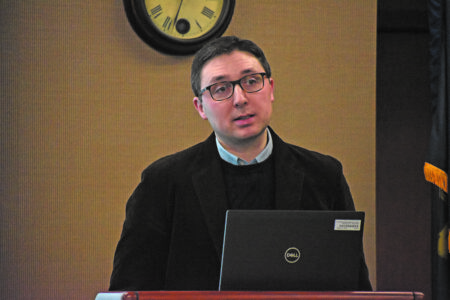The why behind the wolf debate
HOUGHTON – Michael Nelson and his team may have carefully coded and analyzed hundreds of public comments on whether the National Park Service should intervene to rescue Isle Royale’s wolf population, which is in danger of local extinction. But he’s not really that concerned with the actual recommendations.
Academics spend a lot of time taking polls and gauging public opinion, the Oregon State University professor of environmental philosophy and ethics said last night at Michigan Tech, “but I’m only kind of interested in that.”
“I’m interested in why they think what they do,” he explained.
Nelson said he and colleagues created a system to code public comments, correlating basic opinions with the stated justifications for those opinions, to better understand why people felt Isle Royale’s wolf population should be augmented or left alone.
The majority of those in support of immediate intervention made what he considers utilitarian appeals, he said – arguments focused on maximizing happiness, welfare and well-being.
“They cited collective benefits, like the suffering of the animals and the benefit to science,” he said.
Those in favor of a hands-off approach often cited natural law theory, he said, writing that human decisions should not attempt to change the natural order of the situation.
Rolf Peterson, a research scientist with Tech’s wolf/moose study, said thinking about the whys behind ecological perspectives can be valuable.
“If people are real adamant and can’t tell you why, you might tend to discount their opinion,” he said. “But if they offer logical thinking that’s well informed, it can help you reevaluate your own ideas.”
Peterson is a proponent of bringing new wolves to Isle Royale, but said a statement by a board member of the group Wilderness Watch, which opposes intervention, inspired a question he posed during Nelson’s lecture. When deciding whether to import more wolves, he wondered, did it matter whether human-inflicted damage to the wolf population was intentional?
“It was certainly was one of the more thoughtful statements I’d seen,” Peterson said.
“To that person, whether they’d done it in purpose or whether it was inadvertent mattered.”






